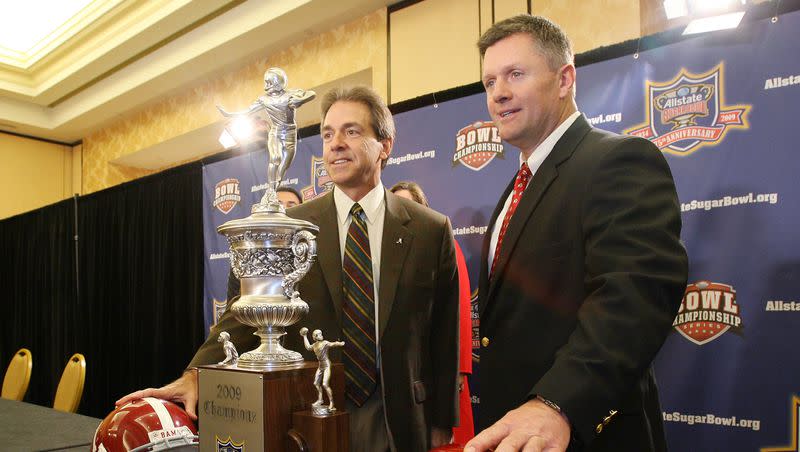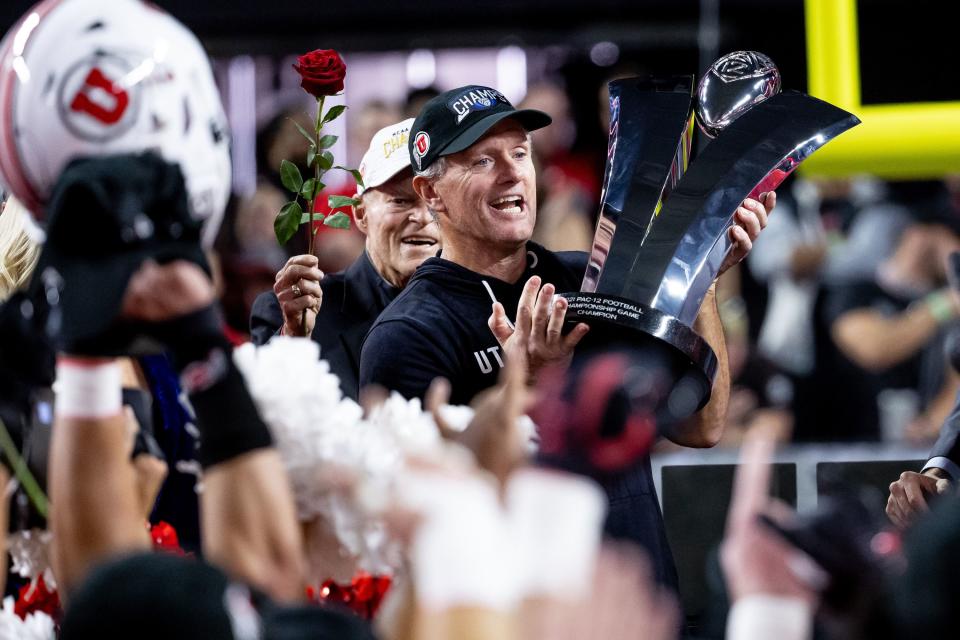How much of Utes’ success is due to the sheer force of Kyle Whittingham?

- Oops!Something went wrong.Please try again later.
- Oops!Something went wrong.Please try again later.
As Utah prepares for another football season and its second conference move in 12 years, there’s a question that the Utes must consider. It’s a subject they’d rather avoid, something so terrible to contemplate that, well, maybe we shouldn’t even mention it.
But let’s do it anyway.
What will life be like after Kyle Whittingham?
Under his intense, no-nonsense and sometimes coldly efficient leadership (remember all those offensive coordinators he sent packing?), the Utes have risen to become one of college football’s big boys. At this point, the real question is whether Utah’s prowess is on solid enough footing that it is coach-proof. Is it one of those programs that can continue to win regardless of the inevitable coaching changes or is it simply the product of one rare coach and the power of his personality?
No program is completely coach-proof, but the top programs almost always manage to win through coaching turnover. If they slump, it’s usually short-lived. Ohio State could win with a German shepherd on the headset. Ditto for Michigan, Notre Dame, USC, Alabama ...
With every passing year it becomes more apparent that the success of Utah has come via the sheer force of nature that is Whittingham. He has overseen the greatest era in school history (ignoring Urban Meyer’s brief, win-and-run success), and he has done it against all odds.
Related
Consider what he has accomplished. During his first six full seasons as head coach, he built the team into a monster. In Year 4, the Utes beat Alabama in the Sugar Bowl, finished the 2008 season unbeaten and ranked No. 2 in the country. If there had been a national playoff at the time, the Utes would’ve been there. During the last three years of that stretch they won 33 of 39 games. The Utes had arrived.
Then the school threw a curveball at Whittingham by moving to the Pac-12. Whittingham essentially had to start over, upgrading the program to compete at that level. It set Whittingham and the Utes back about three years, a period in which the Utes won only 18 games, including consecutive 5-7 seasons.
Then the Utes took off again and haven’t looked back. They have become a regular top-25 program, and only a pair of Rose Bowl losses kept them from finishing better than 12th and 10th, respectively, the last two seasons (they were ranked 10th and seventh heading into those games).
They have won four division titles and the last two Pac-12 championships. They have won 40 games the last four full seasons. They have done all this with different players and different assistant coaches — but only one head coach. Whittingham has been the constant variable.
His success defies explanation. No one wins more with less than he does. He rarely signs a five-star recruit, which is not difficult to understand. He faces inherent challenges. One of the richest recruiting grounds is the West Coast, where many of the Pac-12 schools are based.
Related
That means Whittingham not only has had to recruit from his opponents’ backyard but also convince recruits to come to a smallish market with cold weather. Some of Whittingham’s best players have been leftovers the West Coast schools passed over.
So, Whittingham and his staff don’t sign many ready-made players; they have to develop them (read: coach). And yet his teams have produced an inordinate number of NFL picks (30 in the last nine years) and they have beaten the teams (USC, Oregon, Washington) with the five-star recruits.
Which brings us back to the question: How well will the Utes make the transition whenever Whittingham leaves? It’s relevant because as the Utes position themselves in the future for whatever the next realignment brings — and the march toward the inevitable buildup to one or two super conferences (we just witnessed the most recent shakeup) — will the Utes be thought of as a coach-driven program that will slip when he rides off to retirement or one that is capable of carrying on, business as usual.
Whittingham is 63 and beginning his 19th full season as head coach; probably not even he knows for sure when he will step aside. Whenever it happens, his departure will send the Utes into uncharted territory and an uncertain future.


